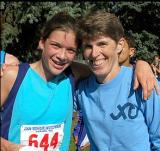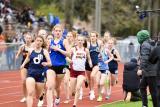Folders |
Running Issues: Title IX Perspective With Patty LeyPublished by
Looking Back, And Forward, On Title IX’s 50th Anniversary With They Legendary Coach Ley By Elizabeth Carey for DyeStat When Patty Ley was introduced to sports, including track and field, Title IX — the law that prohibited sex discrimination and codified equality for student-athletes — was in its infancy. “I wasn’t even aware of it until post-college, as a law or how it affected things,” said Ley, 57, an accomplished athlete and cross country and track coach at Gig Harbor High in Washington. In many ways, she was luckier than most girls her age, who faced a dearth of athletic opportunities plus extra-narrow gender-based cultural expectations. Ley was lucky to attend St. Charles elementary in Tacoma, Wash., where the Catholic Youth Organization (CYO) introduced all students to sports, encouraging girls to participate. She was also lucky to have inclusive coaches and be a part of high-performing programs that insulated her at least somewhat, she said, from inequities as she rose to the collegiate ranks and beyond. Her wide-ranging experience as both a competitive athlete and coach at multiple levels of cross country and track and field gives her a unique perspective, especially on the 50th anniversary of Title IX. We discussed how far our pushes for equality in our sport have brought us, and how far we still have to go. As Title IX began to apply to school sports in the mid-1970s, Ley was introduced to softball. Then, to the sports that hooked her: track and field and cross country. As a freshman at Bellarmaine Prep in Tacoma, Ley competed in Washington’s fifth girls cross country state meet in 1979. Girls raced 2 miles; boys 2.5. In 1980, that changed and everyone raced 3 miles. Washington was “kind of a unique state in that way,” Ley said. Coaches and others believed “Girls can do it.” Ley hit her stride in the midst of a group of competitors whose results, as fellow Gig Harbor coach Kevin Eager put it, “are only now being equaled with any regularity. They weren’t just pioneers, they were super elites.” Ley explained, “The women and girls who were excelling at the time, they were the ones who were athletic…You could see the cardboard on the shoes we wore.” They inspired each other, diving into training and competition. The training, she said, resembled what the guys were doing — a “last-man-standing” approach. Looking back at a training log, she noted hitting 60 miles per week in the last week of summer, as a 14-year-old. “I didn’t have trouble with that. We just did it,” she said. “To a certain extent kids who got hurt self-selected out. “If you look at where we are right now, like talking about eating disorders and stuff, I don’t think those coaches at the time recognized (those issues),” Ley said. The problems were sprouting up, of course. But the sport-specific ideals of the day boiled down to: “How do I get my women to look like men?” Of course, most athletes and coaches at the time were men. That was the mold, despite women’s capabilities. It wasn’t until Ley’s senior year of high school that the sports bra was developed. At Bellarmine, Ley’s coaches J,erry Sullivan and Sam Ring invited trail-blazing runner and coach Doris Brown Heritage, from Seattle Pacific University, to hang out with the team. When Ley moved to Gig Harbor High in 1981, there was one woman on staff, hurdle coach Phyllis Payne. Ley also credits women officials —Darlene Hickman, Gwen Roberston, Carole Langenbach — as “huge in my development and how they helped.” By her 1983 graduation from Gig Harbor, Ley had earned three individual state track titles, two relay titles, and two individual cross country titles. She owned school records from the 800 meters through the 3,200, and had won team championships as well. By then, the NCAA had begrudgingly taken on women’s collegiate sports and Ley went to the University of Oregon, where coach Tom Heinonen and the women’s squad were finding tremendous succes as a national powerhouse in cross country and track. “It was an incredibly intense, amazing experience,” she said. Unfortunately, Ley fractured her foot her senior year of high school and required surgery as a freshman, and was only able to start cross training four months in. Ley transferred to Washington State, but, she said, “Wasn’t mature enough,” and left, got married, and started a family. Eventually, though, she finished out her collegiate career in the NAIA at Pacific Lutheran University, earning All-American honors, setting school records, and qualifying for the 1992 Olympic Trials in the 1,500 meters. All this, against the backdrop of increasing opportunities for women in sports, set the stage for her coaching career. She kicked it off at Gig Harbor in the 1990s, coaching boys and girls to multiple state cross country championships, podium finishes, and national championship invites. In 2009, she moved to coaching at Christopher Newport University in Virginia, and then in 2011 led the women’s distance program at Gonzaga University in Washington. In the earlier eras she noticed programs fighting to get the bus to go compete, or to get the money for uniforms — "there’s plenty of that stuff, still,” she said. After watching the administrative changes of the 1980s, she noticed colleges blaming Title IX in the following decades as they dropped programs for “quote- unquote financial reasons…It would be interesting to see how much money was actually shifted into women’s programs or into higher end basketball and football programs…They are still doing that. There are still low expectations.” Coaching at the Division I level revealed the haves and have nots, the discrepancy between an athletic department's big-revenue programs and the rest. Ley returned to Gig Harbor HS as head cross country coach and track mid-distance assistant coach in 2019, where she continues to find success — including with the 2021 Washington State cross country 3A boys second-place and girls third-place teams, and ambulatory champion Michael Johansen. She implores her athletes to stay involved in the sport, whether as hobby joggers, cross country/track parents, officials, or coaches. “At the high school level, I’ve always coached men and women. It was super weird to coach (just) the women at Gonzaga. What I’ve heard too often is ‘we need a women’s coach to understand (women) — it becomes women shouldn’t be coaching men,” she said. “Women can coach. Athletes are athletes. Coaches are coaches.” Of other coaches, she asks: “Are you willing to learn from make mistakes? To learn and grow?” Especially after the pandemic, it’s important “to recognize we need to rebuild kids’ confidence…that we don’t get frustrated because we did take a couple steps back…Let’s remain hopeful about cross country and track and field,” she said. “In terms of Title IX, as we move forward, can we get to the point where we have the opportunities? We just want to be in a place where we’re not denying kids, or we are not finding ways or finding excuses to deny kids opportunities (and resources). I’d love to see the day we didn’t need it. Can we change things so we don’t need it? Hopefully there’s a point we change the culture so it’s not necessary.” ### Elizabeth Carey (https://elizabethwcarey.com/) is a writer and running coach based in Seattle, Washington. Her first book, GIRLS RUNNING, co-authored with Melody Fairchild, is available at your local bookstore and here: https://shop.aer.io/GirlsRunning/p/Girls_Running_All_You_Need_to_Strive_Thrive_and_Run_Your_Best/9781948007184-9934. |






